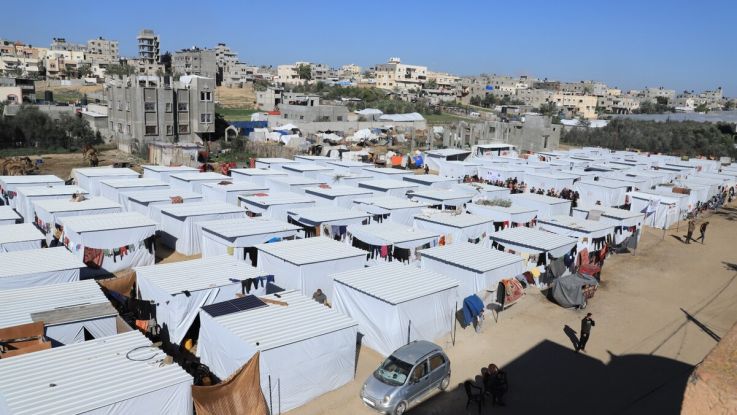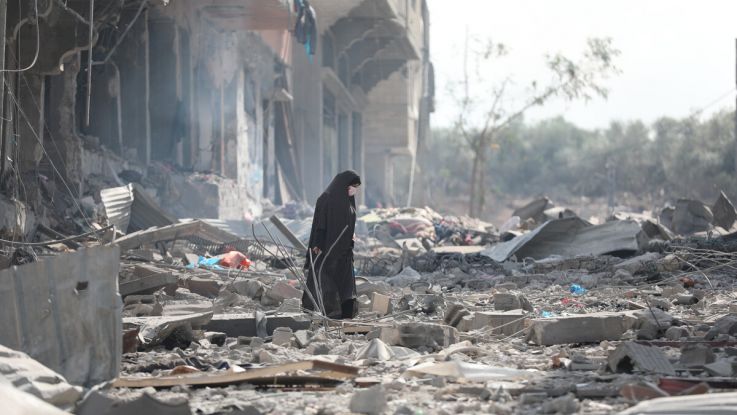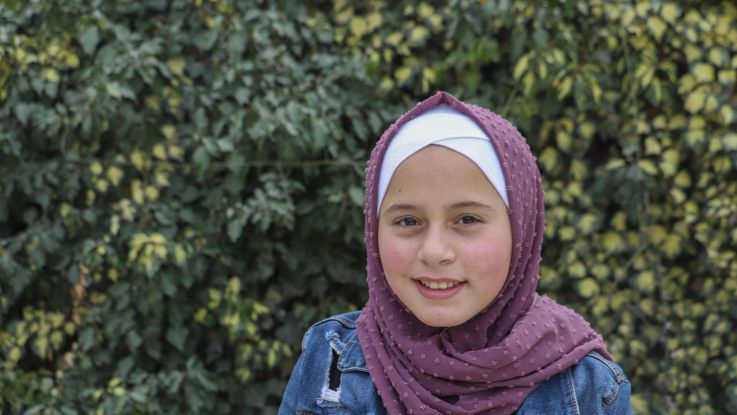Why the earthquake is a double crisis for Syrians in Turkey and Syria
15 February 2023
Years of civil war, the pandemic and now an earthquake is devastating Syrians - those who took refuge in Turkey and those still living in Syria.
Find out why Syrians need your help now more than ever.
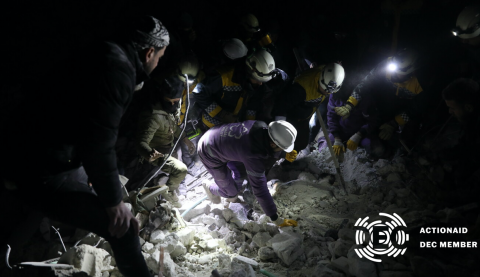
ActionAid's partner in Syria, Violet rescuing people from under the rubble. Photo: Muhammad N. Haj Kadour/ActionAid
One week on from the devastating earthquakes in Turkey and Syria, our rescue teams are clearing the rubble from under collapsed buildings and trying to distribute aid to those who have been displaced and are now homeless.
Around 12 million people lived in the area where the first earthquake hit, near the border of Turkey and Syria, including two million Syrian refugees mostly living in tents and makeshift structures in camps on both sides of the border.
Syrian refugees in south-eastern Turkey and those internally displaced in north-western Syria because of the war, will once again be uprooted and face a double crisis.
As a protection coordinator with Violet, a rescue and aid organisation in Syria I have seen the devastation unfold first-hand.
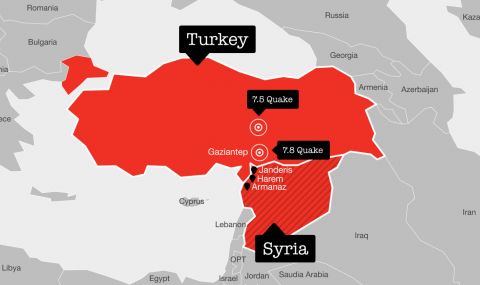
Map of Turkey and Syria showing where the earthquakes hit. Photo: ActionAid
How is the earthquake affecting Syrian refugees in Turkey?
The early morning of February 6 brought back terrible memories for Syrians who found shelter in southern Turkey during a protracted 12 year crisis.
Overwhelmed with flashbacks from the Syrian war, people told me that they had just begun to absorb the tragedy that was the first large earthquake to take place in the region in decades. After a few hours of taking refuge outside, they went back to their homes to grab what was left, when a strong aftershock took place.
In fact, it was a massive 7.5 earthquake that occurred not far from the first location. Whatever remaining buildings were still standing - collapsed, and more people got stuck under the rubble.
Turkey shares a long, land border with Syria and nearly 4 million Syrians1 now live in Turkey since the civil war started in Syria in 2011. More than a third of these refugees are hosted in south-eastern Turkey, near the Syria-Turkey border where the earthquake erupted.2
People living in the regions impacted by the earthquake were already in very vulnerable situations having fled their homes in Syria.
Throughout the search and rescue heavy rain and extreme weather conditions in the region were making it even more difficult to recover people from the wreckage.
Winters here see very cold temperatures and this will add to the perils faced by many people who have lost their homes.
The big challenges for Syrian survivors of the earthquake
The same day, in the war-torn region of Syria, local people awoke to a scene they have become familiar with after years of conflict - collapsed buildings and people being rescued from under the detritus.
Here, the scale of this tragedy is unprecedented, and the situation is deteriorating daily.
In the north-west, numerous buildings completely collapsed. The supply of equipment and rescue teams was very limited.
In one area where more than thirty buildings collapsed, only one rescue team was working at the onset of the crisis.
People under the rubble were screaming, but help was not within easy reach. All of this was made worse with the biting cold and wet weather.
Often when there is a crisis in Syria, our neighbouring country, Turkey, usually provides lifesaving equipment to sort through the remains from earthquakes and support in recovering people from under the wreckage.This time round, with both Turkey and Syria affected, Turkey did not have enough equipment or resources to provide their usual level of support to Syria.
I saw people resorting to using their hands to sort through the remains due to a lack of equipment, so we were losing vital time in the race to save people trapped under.
The north-west of Syria is home to 4.3 million internally displaced people who live in temporary shelters including tents and fragile structures. These families were already badly affected and have now found themselves displaced again.
Having lost all their possessions in the debris, they were now homeless without their belongings amidst freezing temperatures below zero at night.
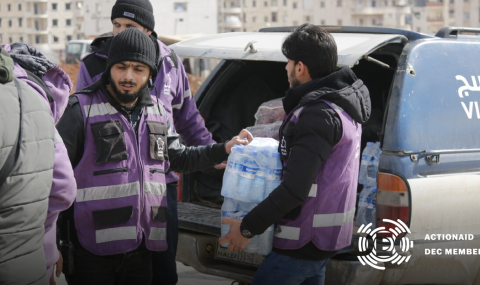
Violet's rescue and aid workers distributing supplies to those most in need. Photo: Muhammad N. Haj Kadour/ActionAid
When we started responding, we found out that host communities and internally displaced people were on the streets with no blankets, food, and without access to any means of communication, or any access to cash. People started moving to nearby camps, which became overcrowded quickly. Tents suddenly became unavailable as temperatures dropped.
The biggest challenge now is helping the rescued people. The relief points are overly crowded and can no longer respond. The health and medical system in the north-west of Syria is overwhelmed. Hospitals are overcrowded and are struggling to even admit patients.
Another challenge we are facing is the shortage of burial supplies as the death toll is increasing, especially since there is already a war in Syria. People are now being buried in mass graves.
As the weather turned colder, we started distributing blankets and food. Some people and organisations also offered shelters. However, despite a number of ready-to-eat meals we've distributed, there is still a large shortage. Markets were closed following the earthquakes and no food or provisions were coming through from Turkey so things were very challenging.
We cannot just enter a camp and only distribute kits to those affected by the earthquake, there are also previously displaced people from the war in the same camps. These problems are pre-existing and compounding.
How is the earthquake affecting women, girls and marginalised communities?
We are prioritising women’s needs especially those who have lost loved ones.
Our two safe spaces have been set up so that women and girls can receive specialised services including psychological support.
Our Mental Health Team also works with women who have lost their children or other loved ones and are experiencing shock and extreme trauma.
What is ActionAid doing to help in Syria?
Rescue operations are most successful during the first 48 to 72 hours after a disaster. Had it been summer, people stuck under the rubble could survive for up to five days, especially if breathing equipment was available. But the current cold weather has made things worse.
We are now expecting a snowstorm starting in Istanbul and then drifting to south of Turkey and north-west of Syria. So, we are worried the tragedy will compound.
The camps could be affected, tents may collapse, and roads can end up being blocked. Sending help will become even more complicated.
Right now, we need more advanced equipment like bulldozers, trucks, ambulances, and more fuel to face the imminent snowstorm. North-western Syria is expected to be affected by this storm and from possible flooding that the weather will bring.
For women and girls, we are providing safe spaces to shelter and receive emotional support, care for pregnant women and counselling for families and children who have lost their loved ones.
My organisation Violet works closely with ActionAid. We are providing emergency support through rescue operations, warm clothing, and food to everyone who has lost their homes and are out on the streets.
How you can help Syrians affected by the earthquake
Syrians have been displaced multiple times and will have lost everything again as a result of this earthquake.
We are now working in bitter, sub-zero conditions to get shelter, food, protection and psychological support to desperate survivors.
Our urgent needs include baby milk, food, water, as well as protection services, mental health support particularly for traumatised childre and safe spaces to prevent violence against women and girls.
Please donate what you can today.


